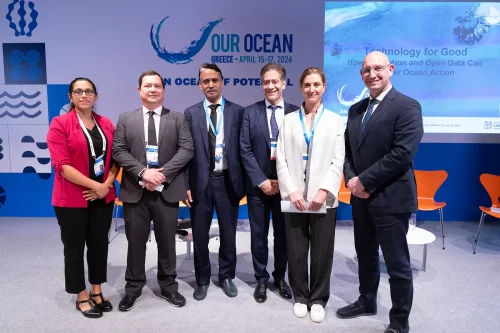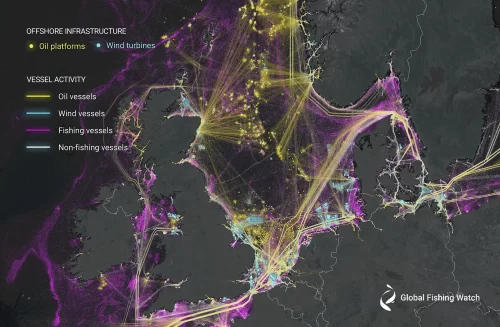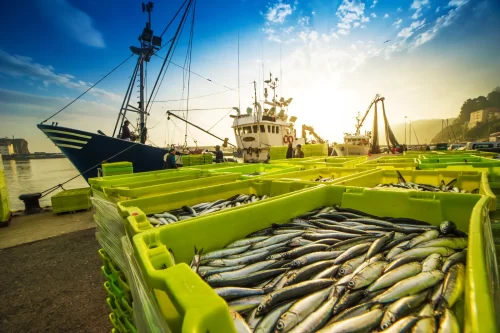Defense Innovation Unit and Global Fishing Watch Announce the xView3 Challenge to Combat Illegal, Unreported and Unregulated Fishing
MOUNTAIN VIEW, Calif. — The Defense Innovation Unit (DIU) and Global Fishing Watch (GFW) today announced the xView3 Challenge prize competition to identify the best computer vision algorithms to advance the fight against illegal, unreported and unregulated (IUU) fishing.
The xView3 Challenge is a global call for skilled developers to harness satellite-based synthetic aperture radar (SAR) data to detect dark vessels. The $150,000 prize purse for this Challenge is provided by DIU and GFW and will be awarded to U.S. and international participants (individuals and companies) with the best performing algorithms. Winning machine learning algorithms must be able to automatically detect and characterize dark vessels—vessels that do not publicly broadcast their location or appear in public monitoring systems—in these SAR images. SAR technology can penetrate clouds and darkness to reveal these dark vessels’ location and activity.
IUU fishing is a threat to food security, marine ecosystem health, and geopolitical stability. According to the Food and Agriculture Organization of the United Nations, IUU fishing accounts for 20 percent of the global seafood catch and up to 50 percent in some areas. The Department of Defense (DoD), partners and allies, and major nonprofits are interested in rapid detection of IUU fishing activity to mitigate these damages.
“IUU fishing undermines a nation’s sovereignty, threatens its economic security, and weakens global rules-based order,” said Vice Admiral Scott Buschman, U.S. Coast Guard Deputy Commandant for Operations. “The United States can provide global leadership to combat IUU fishing by creating partnerships and collaborative, durable networks. Our collective efforts start with maritime domain awareness; we must cooperate and communicate among enforcement authorities and share pertinent information, including with non-government entities that share our objectives and can help disseminate information quickly to our network of partners.”
The xView3 Challenge is organized and run by DIU in collaboration with GFW, an international nonprofit organization advancing ocean governance through increased transparency of human activity at sea, with additional support from the U.S. Coast Guard, the National Oceanic and Atmospheric Agency (NOAA), and the National Maritime Intelligence-Integration Office (NMIO).
Tracking data from the publicly available automatic identification system (AIS)—a system similar to how air traffic control tracks planes—is an increasingly valuable tool to monitor fishing activity, but vessels are known to switch off their AIS devices or tamper with them to hide illicit activities. Large-scale analysis of space-based SAR has the potential to fill in these important gaps in the AIS data.
The Challenge will provide competitors with one of the largest open access maritime datasets ever derived from SAR satellites. The scalability of automated vessel detection and characterization derived from such SAR imagery could dramatically enhance situational awareness of IUU fishing activity and, as a result, lead to more focused patrols and interception of suspected offenders.
“We are excited to partner with the Defense Innovation Unit, Global Fishing Watch, and the U.S. Coast Guard on the xView3 competition to be on the cutting edge of the fight against IUU fishing,” said James Landon, Director of NOAA’s Office of Law Enforcement. “Together we can leverage technology to tackle this pressing issue and develop solutions that strengthen our dark vessel detection capabilities—allowing us to improve the interdiction and prosecution of IUU fishing.”
DIU and GFW will share the open source algorithms, reflecting the organizations’ vision to harness open source, low-cost data to advance maritime domain awareness and collaboration among governments, nonprofits and academia to combat IUU fishing.
“This contest is a great opportunity for us to advance state-of-the-art technology for detecting dark vessels,” said Paul Woods, chief innovation officer at Global Fishing Watch. “We can help eliminate illegal fishing by making the best solutions open and applying them to a global, free data set that enables other actors to also benefit from these highly scalable tools. The more people that can use these tools, the faster we will reduce the scope for bad actors to operate in our ocean.”
xView3 builds on the foundation laid by DIU’s two prior xView Challenges, which resulted in algorithms that provide automated post-disaster assessments of roads, bridges and buildings by leveraging winning machine learning algorithms. The xView2 Challenge attracted more than 2,000 submissions; the top three algorithms had an 80 percent damage assessment success rate—four times better than the government baseline algorithm. The winning solution was deployed to assist with the 2019-2020 Australian Bushfires, 2020 California fire season, and the 2020 U.S. hurricane season. The xView2 datasets are currently used by more than 30 government agencies, academic institutions, and industry partners for research and operational use.
“Our goal with this series of challenges is to attract new ideas to some of the most important global safety and security problems as well as to put new operational solutions in place at the speed of relevance,” said Michael Brown, director of the Defense Innovation Unit.
xView3 will go live in August and the challenge itself will run for three months. Those interested in participating and learning more can register now at https://www.diu.mil/ai-xview-challenge to receive updates. Further details about the challenge, rules and prize breakdown will be available on the competition website.
###
Media Contacts:
Defense Innovation Unit Contact: [email protected]
Global Fishing Watch Contact: [email protected]
xView Challenge Series: xView is a series of international computer vision competitions run by the Department of Defense’s Defense Innovation Unit (DIU) that advance, benchmark, and procure state of the art machine learning algorithms in domains relevant to national security.
Defense Innovation Unit (DIU): A United States Department of Defense organization accelerating the adoption of commercial technology to advance national security.
Global Fishing Watch (GFW): an international nonprofit organization dedicated to advancing the sustainability of our ocean through increased transparency of human activity at sea.
US Coast Guard (USCG): The Coast Guard is the U.S. agency with the authority, resources, and capability to enforce maritime natural resource laws, and is responsible for performing at-sea enforcement operations.
National Oceanic and Atmospheric Administration (NOAA): A scientific agency in the US Department of Commerce that focuses on the conditions of the oceans, major waterways and the atmosphere.


